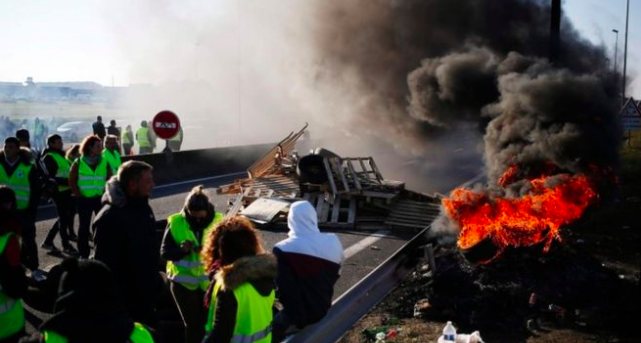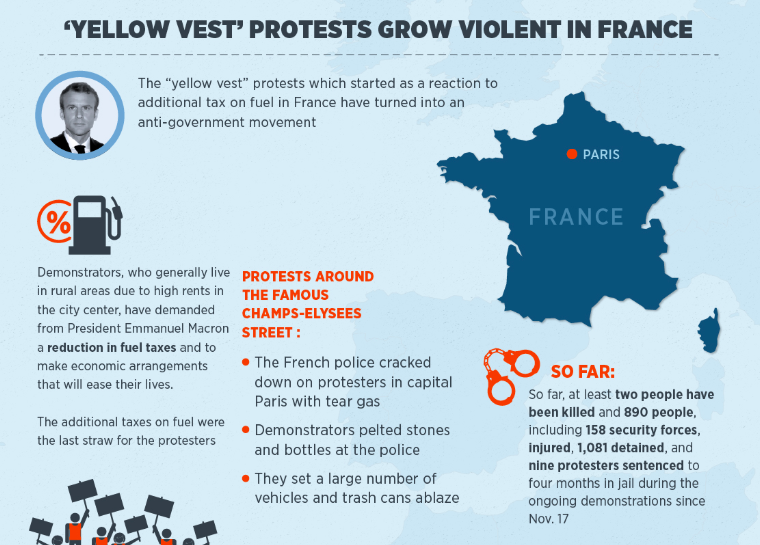Lessons from the Gilets Jaunes
December 16, 2018 | Expert Insights

As Paris experiences its fifth consecutive week of anti-government protests, the two main concerns that remain unresolved is the lack of protection for the poor from green taxes and the absence of leadership among the protestors. We highlight the lessons learned.
Background
The price of diesel, the most commonly used fuel in French cars, has risen by around 23 per cent over the past 12 months to an average of €1.51 (£1.32; $1.71) per litre, its highest point since the early 2000s. World oil prices did rise before falling back again but the Macron government raised its hydrocarbon tax this year by 7.6 cents per litre on diesel and 3.9 cents on petrol, as part of a campaign for cleaner cars and fuel. The decision to impose a further increase of 6.5 cents on diesel and 2.9 cents on petrol on 1 January 2019 was seen as the final straw.
Mass demonstrations across Paris, part of the "gilets jaunes" or "yellow vests" movement, which oppose mounting gas prices and eco-taxes on polluting forms of transport, have occurred in protest of France’s rising fuel prices. The movement originated from an online petition by a cosmetics saleswoman in the east of Paris and has since expanded into a nationwide campaign for the country’s lower income groups who feel neglected by the central government. France's interior ministry says about 136,000 people took part in the protests nationwide. The impact of the "yellow vest" demonstrations has been keenly felt in France, where the government has been forced to bow to pressure and change its economic course.

Analysis
Anticipating a fifth straight weekend of violent protests, Paris' police chief has said that armoured vehicles and thousands of officers will be deployed again in the French capital. Security services intend to deploy about 8,000 officers and 14 armoured vehicles in Paris on 15-16 December 2018.
In France, private sector business activity contracted for the first time in two and a half years as the "gilets jaunes" protests took their toll. After the figures were published, the euro fell 0.6 per cent to below the $1.13 mark. The French index hit depths not seen since November 2014.
The protestors are from rural areas, and from France’s lower income groups. These groups are especially vulnerable to green taxes. When the government imposes a flat tax on motor fuel as Mr Macron did, it hits the poor hardest because it eats their already limited disposable income. The fuel rises were doubly galling for the yellow vests in suburban and rural areas because they are unable to rely on good public transport as their wealthier counterparts in the city do. Mr Macron’s fuel tax took from people struggling with living costs and diverted the proceeds to wind farms instead.
This is contrasted by a policy in Australia that deliberately re-directed carbon taxes to help the worse-off. However, interest groups and political parties claimed that the carbon tax was: “A big fat tax on everything”, and the policy was eventually repealed.
Counterpoint
President Emmanuel Macron has responded to the nationwide street protests by scrapping an unpopular fuel tax rise and promising an extra €100 a month for minimum wage earners and tax cuts for pensioners. Regardless, the protests show no signs of abating. Officials say this is largely due to the lack of leadership among the gilets jaunes.
Protesters have smashed windows, looted stores and burned dozens of cars in many parts of the city, despite nearly 90,000 police being mobilised across the country. While some of the movement's representatives have said they are open to halting the protests to negotiate with the government, others have said its concessions are not enough and have vowed to protest again in Paris.
Assessment
Our assessment is that the Giles Jaunes protests in France highlight three main issues: first is for governments to recognise and address the needs of the poor when designing a clean energy policy. The second is that these policies must be clearly communicated to the public to prevent false narratives from instigating protests. The third issue is the requirement for strong leadership, which was one of the clear demands from protestors, to facilitate dialogue between the state and dissenters while minimising chaos. We also believe that the enormous financial consequences, political instability and violence that stem from such protests could be prevented by preemptive policy measure.
India Watch
India accounts for 4.5 per cent of the world’s greenhouse gases, so it plays a crucial role in combating climate change. Owing to the intrinsic risks of flooding, high temperatures, and an even greater threat to food security, no country has a greater incentive to remediate the threat of global warming.
However, implementing green taxes in India will need to be handled with caution. Financial policies such as demonetisation and the goods and services tax, and the lack of an effective minimum support price, have initiated protests across the country. The years between 2015 and 2018 have seen several farmers marches across the country; the most recent protest in December 2018 saw 100,000 farmers travel to the national capital from across the country.
Farmer protests in India have so far been conducted in accordance with democratic norms, but their origins are similar to those in France: a feeling of being disadvantaged by tax laws and neglected by the central government. Failure to address their needs could precipitate increasingly unmanageable demonstrations from India’s lower income groups and situations that we see in Paris is not inconceivable in the future.








Comments